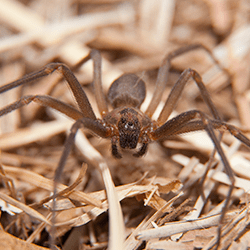When it comes to dangerous spiders, there are two Tennessee spiders that need no introduction. We're all familiar with the black widow and the brown recluse. Both of these spiders have a reputation--and they've earned it. Let's take a look at the differences between them, and how those differences may affect you.
Venom
All spiders have venom. They use it to subdue their prey. What makes the black widow and the brown recluse dangerous is that their venom can cause serious illness for humans.
A bite from a black widow spider can come with cramps, muscle pain, spasms, and chest pain. There may also be flu-like symptoms including fever, chills, sweating, nausea, and even vomiting. For some, symptoms can progress to severe high blood pressure and shock.
Brown recluse spider bites are not associated with flu-like symptoms. This is good and bad. While it may be nice to not feel horrible after being bitten, you might wish you did have these symptoms as a warning. A brown recluse bite can cause tissue necrosis underneath the skin. This can lead to disfigurement or the loss of an appendage.
Harborage
If black widows or brown recluse come onto your property, they are likely to create webbing. This webbing can help you determine which spider you have.
Black widows can create webs in many locations both high and low but they prefer to capture large bugs, so expect to find them in low locations, especially in brush piles or other natural debris. You can also expect to find the black widow in her web, hanging upside down. Webs from this spider are likely to be outside of your home and in strategic locations for catching flying bugs.
Brown recluse spiders create tangled webs in low locations, just like the black widow. But, unlike those widows, the recluse doesn't use its web to catch prey. Brown recluse are hunters. Their webbing is only to protect them when they retreat. For this reason, you're not likely to see brown recluse webs in locations that are strategic for catching prey. You'll find them in secluded locations.
Spider Prevention
While there are many ways to avoid bites from both of these spiders, it is always best to call a professional when a dangerous spider appears in your home. And, if you have not seen dangerous spiders in your home, it is important to understand that ongoing pest control can help you keep it that way.
If you'd like more information about dangerous spiders, or you'd like to set up a free in-home evaluation, reach out to us. All-American Pest Control protects Tennessee homes and businesses with industry-leading pest control solutions. We look forward to helping you protect yours.
 1436 Reviews
1436 Reviews


